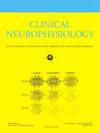Cortical plasticity, therapeutic effects, and neural circuit activity of angular gyrus rTMS in amnestic mild cognitive impairment
IF 3.7
3区 医学
Q1 CLINICAL NEUROLOGY
引用次数: 0
Abstract
Objective
This study aimed to explore the neurophysiological mechanisms behind the improvement of cognitive functions through angular gyrus repetitive transcranial magnetic stimulation (rTMS) in patients with amnestic mild cognitive impairment (aMCI) by assessing cortical plasticity, underscoring the predictive value of cortical plasticity for clinical outcomes.
Methods
Twenty-seven aMCI patients were allocated to the intervention and control groups for 4 weeks of 20 Hz rTMS of the angular gyrus. Long-term potentiation (LTP)-like cortical plasticity in the motor M1 area, in conjunction with neuropsychological tests and resting-state brain imaging, was used to investigate the mechanism behind angular gyrus rTMS.
Results
At baseline, aMCI patients presented impaired LTP-like motor cortical plasticity related to cognitive damage. Following treatment with angular gyrus rTMS, a reversal in the impairment of this plasticity was observed. This improvement was associated with clinical efficacy in terms of cognitive function and changes in the resting-state brain network activities of the sensorimotor, default mode, and frontoparietal networks.
Conclusions
Clinical symptoms are alleviated by angular gyrus rTMS, and damaged cortex plasticity also shows signs of improvement, potentially linked to transcortical neural activity across multiple brain regions in aMCI patients. Cortical plasticity induced by transcranial magnetic stimulation has potential value in predicting the clinical outcomes of neuromodulation.
Significance
Motor cortex plasticity may be related to cognitive function and therapeutic effects in aMCI patients and may be modulated by angular gyrus transcranial magnetic stimulation.
角回rTMS治疗健忘轻度认知障碍的皮质可塑性、治疗效果和神经回路活动
目的通过评估脑皮层可塑性,探讨角回重复经颅磁刺激(rTMS)对遗忘型轻度认知障碍(aMCI)患者认知功能改善的神经生理机制,强调脑皮层可塑性对临床预后的预测价值。方法将27例aMCI患者分为干预组和对照组,进行为期4周的角回20 Hz rTMS。结合神经心理学测试和静息状态脑成像,研究了角回rTMS背后的机制。结果在基线时,aMCI患者表现出与认知损伤相关的ltp样运动皮质可塑性受损。在角回rTMS治疗后,观察到这种可塑性损伤的逆转。这种改善与认知功能方面的临床疗效以及感觉运动、默认模式和额顶叶网络静息状态脑网络活动的变化有关。结论角回rTMS可减轻临床症状,损伤的皮质可塑性也有改善的迹象,这可能与aMCI患者多脑区跨皮质神经活动有关。经颅磁刺激诱导的皮质可塑性在预测神经调节的临床结果方面具有潜在的价值。意义运动皮质可塑性可能与aMCI患者的认知功能和治疗效果有关,并可能受角回经颅磁刺激的调节。
本文章由计算机程序翻译,如有差异,请以英文原文为准。
求助全文
约1分钟内获得全文
求助全文
来源期刊

Clinical Neurophysiology
医学-临床神经学
CiteScore
8.70
自引率
6.40%
发文量
932
审稿时长
59 days
期刊介绍:
As of January 1999, The journal Electroencephalography and Clinical Neurophysiology, and its two sections Electromyography and Motor Control and Evoked Potentials have amalgamated to become this journal - Clinical Neurophysiology.
Clinical Neurophysiology is the official journal of the International Federation of Clinical Neurophysiology, the Brazilian Society of Clinical Neurophysiology, the Czech Society of Clinical Neurophysiology, the Italian Clinical Neurophysiology Society and the International Society of Intraoperative Neurophysiology.The journal is dedicated to fostering research and disseminating information on all aspects of both normal and abnormal functioning of the nervous system. The key aim of the publication is to disseminate scholarly reports on the pathophysiology underlying diseases of the central and peripheral nervous system of human patients. Clinical trials that use neurophysiological measures to document change are encouraged, as are manuscripts reporting data on integrated neuroimaging of central nervous function including, but not limited to, functional MRI, MEG, EEG, PET and other neuroimaging modalities.
 求助内容:
求助内容: 应助结果提醒方式:
应助结果提醒方式:


